#webcomic fubuki
Text
About Acquaintances and Human Bonds.
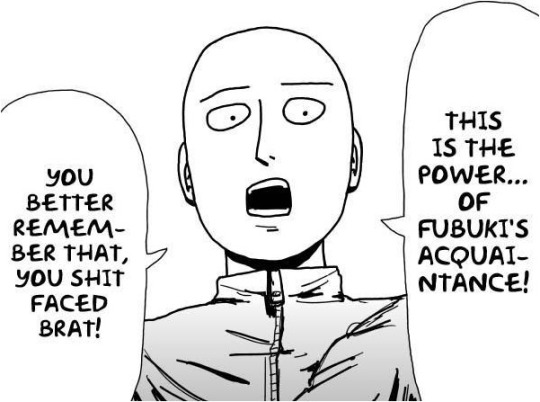
In this post I want to take a look at the “I’m just an acquaintance” moment and examine what significance it holds in the context of the Esper Sisters arc, its themes and all the characters involved.
This post only takes into account the webcomic version of the arc.
Disclaimer: this is my interpretation of the scene, the characters and the series in general given the current released material. Future updates can always change the meaning behind this moment and add further context to it, thus proving me completely wrong. By the way, I do not ship anyone in the series (more power to those who do, however) and none of what follows implies romance in any way.
First of all, before examining the scene, we have to take into account the arc it takes place in and what was revealed prior to Sataima’s line.
The “Esper Sisters” is an arc entirely centered on the characters of Fubuki and Tatsumaki, whose relationship, already soured by a lifetime of trauma, estrangement and abuse, reaches its dramatic nadir in the confrontation that follows the events of the MA arc. For these reasons, the arc explores the backstories of both characters by featuring flashbacks set in the years of their childhood. In Fubuki’s case, this section of the story contains a crucial and essential episode from Fubuki’s troubled childhood days (Chapter 99: 1, 2, 3 and 4), where it’s explained why Fubuki grew up the way she did, what relationships (or lack thereof) Fubuki had during her growth, and what role her sister and the outside world played in her life (e.g., ”If they bully you, you need to bully them back”, mirrored by Blast’s advice to Tatsumaki). It's not an exaggeration to say that without this fundamental flashback, Fubuki’s character would utterly fall apart and cease to make sense - even the reason why Saitama’s line cuts deep would also fall flat without all the information provided beforehand by the story, as we will see: this memory from Fubuki’s past and everything surrounding it is the keystone holding together the entire narrative of the character and one of the two pillars of the Esper Sisters arc (the other being the Tatsumaki one).
If the flashback alone wasn’t clear enough, in the page that immediately follows, Fubuki explicitly states, with a smug Tatsumaki complementing her words, how she grew up with the only, terrifying company of an oppressive older sibling because no one else dared to approach her with Tatsumaki looming around. This image of Fubuki’s childhood, coupled with the high school flashback from the MA arc (I covered this topic in much more detail here, among other things), paints a rather lonely and gloomy picture of Fubuki’s backstory, a past characterized by a complete lack of significant relationships or personal bonds, aside from her sister Tatsumaki, who controlled Fubuki for most of her life (as stated by the S-Class psychic herself; Chapter 100) and whose shackles are still in place in the present, only slightly loosened but ready to tighten at any given moment (the Esper Sisters arc it’s a demonstration of this, I wrote a post about it). This isolated and sheltered background made Fubuki long for what was totally absent in her life, human contact, but, given the lack of social experiences and the isolation she suffered from the outside world, she grew up ignoring how to form relationships and with no idea of what a normal relationship looks like, something worsened tenfold by the fact that her only parental figure, the one responsible for her isolation, was also a traumatized and unstable person who rejected human connections and actively encouraged Fubuki to embrace her powers and use strength against others; additionally, in the few interactions Fubuki had with the outside world, reality was presented to her as nothing more than a hyper-competitive landscape dominated by violence and discrimination, where people used force as a way to interact with others and idolatred power as the only indicator of individual worth. Therefore, having been raised by someone who values power above anything else and having experienced firsthand how the outside world only understands strength and preys on the weak (i.e., the bullies who emarginated and harassed her, and Tatsumaki always resorting to violence and resolving any conflict with brutal displays of her telekinesis) warped Fubuki’s perception of reality and taught her that she had to embrace her powers and resort to violence at the first sign of a threat if she wanted to survive. A lesson that Fubuki learned and took to heart. And Fubuki was rewarded by doing so, seeing how people in high school started respecting her specifically and solely for her superior telekinesis, but not for Fubuki herself as a person. This conditioned her to view relationships only through a hierarchical lens and as an expression of the difference in powers between individuals, and that, in order to effectively interact with people, aside from employing force, she had to don a façade of haughty superiority, instead of being simply herself; at the same time, her psychological need for friendship never vanished and remained unfulfilled. This background shaped a damaged human being who, in an attempt to adhere to her “education” while, at the same time, filling the void left by the lack of human bonds, resorted to establishing hierarchical dynamics that act as a replacement for real human bonds, where the role the members play in the organization codifies in terms of hierarchy the disparity in power between them, a template that is very reminiscent of Fubuki’s own relationship with Tatsumaki in a way. For most of her life, in fact, Fubuki was either powerlessly submitted to her sister, who dictated the terms of their relationship and held the power in it, or, later in her life and as a reaction to this, a leader with subordinates; beyond these templates, where it was either being subservient or superior to someone, Fubuki never met an “equal”, someone who, by existing outside of a hierarchically organized relationship/dynamic, didn’t fall under either of the aforementioned labels but stood on the same ground as her. As her experiences show, Fubuki only met an oppressive and tyrannic sister, bullies, followers, rivals and subordinates and for her, that was all there was in the world. People never formed connections outside of hierarchical structures, “power” was what attracted people and closer human connections, like even friendship, were totally out of the picture.
That’s where Saitama’s “group” comes into play. Its existence proves how Fubuki’s past experiences are only a partial representation of the world, that people can coexist on equal ground (so beyond the follower/subordinate templates Fubuki was aware of) and that there are alternatives to the toxic and unhealthy way of living Fubuki was following. The people at Saitama’s apartment do not obtain any immediate or foreseeable benefits from their gatherings; there are no rules or “hierarchies” and there is no grand goal that the group is carrying on following a particular agenda: they hang out simply because they want to spend time together. And Saitama himself is far different from any person Fubuki has ever encountered before: he doesn’t use others for his own gain, he doesn’t judge/value other people on the basis of their strength and he doesn’t take advantage of his incomprehensible power to impose his will or to submit and exploit others. As pointed out by Genos at the end of Fubuki’s introduction arc (Chapter 50), Saitama doesn’t antagonize or oppose anyone, but leaves them be, minding his own business without bothering anyone (unless they pick up a fight or represent a danger). Surprisingly enough, even with this particular attitude and his complete disregard for factions/rank/status, Saitama seems to naturally attract people. And yet he isn’t a “leader”, a “boss” or the “president” of a club. Instead of the usual boss/subordinate roles so ingrained in Fubuki’s mind to the point she can’t conceive of any other way to interact with others, Saitama is simply on friendly and equal terms with those who hang out with him, world-renown S-Class Heroes at that, despite him being only a B-Class rank-wise. Among those connections, what surprises Fubuki in particular are Saitama’s peculiar dynamic with Genos, which completely turns upside down anything Fubuki learned about status/ranking and the way these supposedly affect relationships (“D-disciple? An S-Class under a B-Class...”; Chapter 48), insomuch that later Fubuki asks about this “bizarre” dynamic directly to Genos himself in order to learn more about it (“Demon Cyborg, Genos... are you truly satisfied under that man?” Chapter 57), and Saitama’s friendship with the Strongest Man in the World, King (“How... is someone from S-Class so friendly with a B-Class...”; Chapter 50), that similarly ignores status as a factor that determines human interactions, much to Fubuki disbelief - there is also this little reaction upon learning about Saitama’s connection to Fang (“Bang? As in the S-Class Silver Fang?”; Chapter 51). But what’s more is that the unique rules of this group are applied to Fubuki as well: in this place, Fubuki spends her time and interacts with people outside of any social construct and logic previously known to the character and no one looks down on her with contempt nor up to her with reverence due to rank, status and/or telekinesis because these factors do not matter here, where she is neither a leader nor a subordinate, but “simply” a person; and despite the façade the character still resorts to, it’s always in this place that later we will see an extremely rare, if not unique, example of a relaxed and carefree Fubuki spending time in a casual and normal scenario like having a hot pot with other people to whom, beside working for the same organization, she has no actual affiliation (Chapter 57). All of this is completely unheard of and unprecedented for the esper. What the “group” ultimately represents for Fubuki is the importance of positive and healthy human bonds, of people being people, hanging out with no other goal than to stay together - all things that were completely missing in her life. Undescoring the utmost importance of this and establishing the core theme of Fubuki’s character arc (the importance of human bonds), Fubuki’s introduction arc ends precisely with Fubuki wondering if Saitama will allow her to join them (”Would he also let me...”; Chapter 50; in the official manga translation: “Maybe I could join them?”) - definitely not a casual or random choice from a writing standpoint.
So when Saitama says that he “is just an acquaintance” (Chapter 102: 1 and 2), in Fubuki’s mind, he is basically answering the question she was asking herself back in Chapter 50 (“would he also let me/maybe I could [join his group?]”) and she interprets it as “no”, that the only “group” of “normal” people she bumped into has the doors closed to her and won’t allow her to join this haven of “ordinarity”, even though that is not what Saitama meant there. After growing up in a toxic and sheltered environment, for the first time in her entire life Fubuki finally found a group that represents a healthy and positive alternative to all the deleterious experiences she had - an environment where power and hierarchies mean nothing at all, where people are simply themselves - and this made her desire to join this gathering, only to be reminded by the person who exposed Fubuki to this uncharted and fabled reality that she didn’t belong to the place nor, in the end, was she accepted in it - again, this is how Fubuki is perceiving Saitama’s words - due to being only an “acquaintance”. If Chapter 50 sparked in Fubuki the desire to join a group that represents everything that was always denied to her, Chapter 101 seems to put a roadblock in front of Fubuki that prevents the character from fulfilling (yet) what she has always deeply yearned for.
There is no better way to put Fubuki in front of the fact that her façade - the only way she believes it is possible to interact with others - and her mindset are actually keeping her distant from other people and affecting her life for the worse, sabotaging her chances at bonding with others and forming personal relationships. If we look back at her interactions with Saitama and co., in fact, Fubuki’s behavior there never actually manifested nor made apparent her genuine desire to spend time with the group and befriend them, despite the importance the place holds for the psychic and her actual intentions; if anything, whenever she (comically) opted for the defensive mechanism of the façade, which she used in order to fit in as the “new kid on the block” (more on this later), instead of being more genuine, it was something the members of the group didn’t find particularly endearing (Chapter 57; Chapter 98). It all goes to show how lacking Fubuki’s social skills are and how ineffective and inadeguate her way to interact with people also is (besides work, maybe), especially when it comes to ordinary and informal social settings such as this one; it also highlights to what degree Fubuki’s upbringing warped her ability to socialize with other human beings. While the Esper Sisters arc seemingly resolved the outside issue that threatened Fubuki’s freedom, Tatsumaki, Fubuki’s inner demons, spawned by that nefarious influence, are, by the end of the arc, something Fubuki will still have to face in the future. And if it’s true that, ultimately, the connection Fubuki forged as a leader will prove to be a strong and resilient bond once put to the test, Fubuki’s need for friendships, as in a non-hierarchical, not work/duty-related but informal and equal personal relationship, is still left completely unfulfilled, with a journey far from being completed yet. And, honestly, given how we are still in the middle of the story (?), it would be weird if such an important matter for the character was already solved.
For what specifically matters Fubuki’s reaction, in the past I have seen many write what essentially boils down to “what did she expect? Did she think they were friends or something?”. It’s frankly surprising how this confuses so many people because, once we look at the bigger picture and remember Fubuki’s characterization, the reasons behind her reaction become quite obvious since they are all ingrained into the very identity of the character. Again, Fubuki’s expression is symptomatic of the “fear” of having lost her chance at becoming part of something she always longed for - this also fits Fubuki’s insecurity and self-loathing issues, by the way. Sure, it could come off as an overreaction, especially as it is directed toward someone Fubuki met very recently and doesn’t have a strong connection with, but that is precisely the direct result of a sheltered backstory polluted only by unpleasant memories and isolation, to whom Saitama and his group represent an inedited and positive counterpoint; if Fubuki didn’t lack meaningful relationships (both in the past and her present) and her backstory wasn’t one of abuse and alienation, I very much doubt she would have reacted this way to Saitama’s comment or cared at all about about their relationship in general, but if that were the case, we would be discussing a very different character, and this moment would have no place in that story. Therefore, hearing from Saitama words that seem to lock away this dreamed oasis of normality and friendship is a major source of dejection for a person with her specific history, issues and hopes. Having no idea or knowledge of what a friend actually is and what a friendship/close relationship resembles made Fubuki think (or, better, hope) that the time spent at Saitama’s apartment was enough to forge a bond of that kind, a “mistake” that is quite reflective of how inexperienced Fubuki is in regard to people and how utterly ignorant she is about relationships and the way they actually flourish between human beings.
By the way, thinking that Fubuki is only interested in Saitama's strength or that she is still trying to recruit him past her introduction arc would completely disregard Fubuki’s entire characterization and ignore several fundamental moments starring the character, like, for example, the one I linked from Chapter 50, one of the most important and character-defining pages featuring Fubuki in the entire series. Sure, given Fubuki’s background and the values the world projected into her, power is a main factor in what originally caught her attention in regard to this new, mysterious B-Class hero and surely affected how Fubuki’s perception of Saitama has changed over the course of the story. But Saitama as his own person and the precedent he sets is actually way more important to Fubuki than the physical strength he possesses, as he is the first source of positive influence Fubuki was ever exposed to: he is unlike any “strong” being Fubuki has ever met before (for the reasons stated above), and his mindset couldn’t be more different from her only parental figure/role model, Tatsumaki. During their fight (Chapter 48), Saitama didn’t fight back and retaliate, but was more concerned about reprehending Fubuki and reminding her what a hero is and what they stand for: he criticized her obsession with ranking and factions in a world where monsters run amok and few individuals stand against them, warning the esper against her egoistical mindset and predicting a scenario that Fubuki will later experience firsthand (the encounter with Garou; Chapter 78) - all things that will be proven correct and true as Fubuki can attest; even though Fubuki tried to recruit him into her group and then “lost” to him, Saitama never considered her someone he had “to bully back” or a rival/enemy who “must be destroyed”; in the interections following the fight, Saitama never demanded anything from her, he didn’t force her to join his “group”, he didn’t coerce her into following his goals nor did he try to dispose of this “rival”, but treated Fubuki as a human being and even admitted her into his apartment - where Fubuki stayed, or kept coming back behind the scenes, from Chapter 50 to Chapter 64, meaning that Saitama allowed her stay as much as she wanted. From this we can observe how Saitama is the one who finally snaps Fubuki out of her harmful way of living and warns her about the dangers of her conduct, leading the esper into a journey of maturation and improvement, whereas anyone else that Fubuki met before him directed Fubuki onto this very nefarious path, enabled her worst traits and encouraged the psychic to embrace the dangerous mindset that Saitama is criticizing and rebuking. More importantly, there is also the aforementioned existence of the Saitama’s group, which represents a gathering of people completely different from the ones Fubuki has ever experienced. As a testament to the peculiar role Saitama plays in her character arc and what sets him apart from those Fubuki met before, the dialogue in the elevator (Chapter 98) highlights (to me) how much of a high opinion Fubuki has of Saitama as a person, to the point that she lowers her façade and talks frankly, without resorting to the act she aways employs while dealing with others: in this scene, Fubuki is overtly praising Saitama while openly recognizing her own limits/shortcomings, right after he surpassed her in rank and Fubuki’s encounter with Garou proved Saitama right about her issues. None of this is something Fubuki would have ever done with someone she considers a “subordinate” or a “follower” (once again, I’m not implying anything romantic) - for a more in-depth look into the scene, the last section of my post about Fubuki in the MA arc contains an analysis of this conversation and what it means in the context of Fubuki’s character arc. This important dialogue makes all the more clear how much respect and admiration Fubuki holds for Saitama, hence why his comment has such a profound impact on her. Furthermore, when Tatsumaki seemingly killed Saitama, this was Fubuki’s reaction (Chapter 105) - ONE truly has a talent at portraying characters' expressions.
So, personally, I don’t think the subordinate angle matters at all in her reaction about being called an “acquaintance”: after all, Fubuki’s recruitment attempt failed and Saitama made abundantly clear to her that he wasn’t interested in her group (for example, this exchange, Chapter 50: 1 and 2; Saitama even remarked it at the start of the Esper Sisters arc), so, unless we want to believe that Fubuki is a dumbass with short-term memory, something not supported by the story in any way, I think there are other factors at play here and the character has other reasons to care for this person by the point the statement is made. It is important to note that, leading to Fubuki’s reacting to Saitama’s acquaintance comment, ONE specifically decided to depict Fubuki’s reactions growing more and more dejected at being called “not a friend” (“友達” [tomodachi]) and “not a companion” (“仲間” [nakama]) - both indicating a close and/or equal relationships between two persons that share a bond - which, for Fubuki, sounds like he was denying her the “right” (for the lack of a better word) to join; meanwhile, ONE didn’t include any reaction panel to Saitama stating he doesn’t work for her/isn’t part of her group because, since she is not delusional or stupid, Fubuki already knew that and recruiting Saitama is a non-thing by this point in the story. By the way, the recruitment stuff doesn’t even qualify as a recurring gag in the webcomic (at least so far) and the “Fubuki’s group” shtick is barely a thing in the webcomic, consisting of a couple of lines at most, which prevents the character from coming off as a stale and obnoxious parody of herself (unless in the future she gets turned into a rather sad and disappointing comic relief background entity). As mentioned before, the only time in the webcomic Fubuki has tried to recruit Saitama for real (up until now, at least) happened back in her introduction arc; past that point, the leader’s antics are a psychological denfensive mechanism she employs in order to hide her doubts and insecurities, to navigate unknown new dynamics and fit in a “foreign” environment, to compensate for her inability to deal with people in “normal” social settings (the hot pot and the Saitama group in general) or her way to ask for help while putting up appearances (the start of the Esper Sisters arc), instead of actual attempts to get him or others into her group. What draws Fubuki to Saitama and his group is not the egoistical aim to have these powerful beings under her tumb, but a desire that stems from personal reasons deeply rooted in her past. Once again, the fundamental page I linked above (Chapter 50) couldn’t be more explicit and unambiguous in its meaning: on it, Fubuki is expressing her true, sincere desire to join this group of people, wondering if Saitama and co. will permit her to do so; she is not, instead, secretly plotting to make them join her group and use them for her own ends. Surprisingly enough, Fang trying to have Saitama join his dojo is just as much a recurring joke as Fubuki's leader stuff (and way more one-note too, lacking all the subtext present in Fubuki’s case), let alone Flashy Flash’s attempts at becoming Saitama’s teacher in the post MA chapters. Once again, believing that Fubuki is only after recruiting others would completely ignore a core aspect of Fubuki’s character - her subconscious desire to form real human connections with people, compromised by the education that was imparted to her, by her traumas, and by the psychological defense mechanisms she employs in order to not appear “weak” - for the sake of boring flanderization that erases what makes the esper interesting and complex.
Therefore, considering how character-related the topics tackled in this story-beat are for Fubuki, for the reasons stated above, it’s quite reductive, I believe, to label Saitama’s statement as a throwaway gag. Again, ONE made sure to reveal Fubuki’s entire backstory - a backstory specifically centered on a dramatic lack of positive and meaningful relationships and also isolation - before this scene, where, from Fubuki’s point of view, she is denied the right to join a social circle that she is drawn to. This statement ties perfectly into themes that have been linked to Fubuki from the very start (Chapter 50), but also plays into what constitutes the Esper Sisters arc narrative: the “acquaintance” line serves in fact as a lead-up to what Saitama states to Tatsumaki soon afterward, which is emblematic of the core message of this arc and its thematic backbone (again, all things I will elaborate on soon enough). If this was a simple comedic moment unrelated to Fubuki’s personal history, like, for example, how the door gag (Chapter 111) is a joke independent from Flashy Flash’s character and the story of the Ninja arc, then I wouldn’t stress over the importance of this page, but that clearly isn’t the case. Moreover, comedy serving a greater purpose and contributing to the narrative is a trademark of OPM and ONE’s style in general, and while not every single gag in the series accomplishes that, like the aforementioned Flashy Flash joke for example (and nonetheless, it serves to kickstart the Ninja arc and fits the characters), the scene in question between Fubuki and Saitama arc is clearly representative of that principle since it respects everyone’s characterization, takes into consideration their background, has a greater narrative purpose and develops the story accordingly. Beside, I don’t think this statement represents an end point but, rather, a source for future developments for the character(s). Now, I obviously don’t know if there will be a follow-up to it or not, but considering how this scene leaves things open and unresolved, it’s fair to expect progressions regarding this matter. In fact, I don’t see how leaving this relationship in its current state without ever bothering to advance it would make any sense narrative-wise, especially in the context of Fubuki’s character arc.
Before getting to Saitama’s side of things, there is another thing I want to point out in regard to Fubuki because I think it is paramount in order to understand the character and the scene in question.
I don’t keep up with the fan discourse anymore, so I don’t know if this is still a common interpretation of the character or not, but in the past I often saw a few readers describing Fubuki as a sociable and extroverted character. I find it very strange, because every single thing shown about her in the webcomic (from her general demeanor to her backstory) remarks how profound Fubuki’s psychological issues are and how distant and estranged from others she is as a result of her past: Fubuki is shown to have no close connections and to be unaware of how to be socially competent, hence her reliance on a removed and cold façade and the default template of hierarchies as substitutes for real human connections. In the sole instance where Fubuki interacts with people outside of work and under “normal” circumstances (already significant by and in itself), the hot pot with the Saitama’s group (probably the closest thing she ever got to spending time at a friend’s house or a sleepover), she comes off as incredibly ankward and naive, almost socially inept, due to her lack of experiences/social knowledge. I believe that the aforementioned confusion stems from the manga adaptation and, in particular, from its bonus/side art material, but this isn’t the right post to elaborate on the matter. In any case, even the presence of a group of subordinates doesn’t take away from what I stated above; if anything, it somehow accentuates it. Nowhere in the webcomic is it ever implied that Fubuki and the group spend time together outside of missions or work-related matters; their bond is strictly and consistently portrayed only as a boss-subordinate kind of relationship, albeit a positive and ultimately healthy one, in the light of the Esper Sisters arc. The only moment where their relationship progresses past the boundary of a boss-subordinates/work dynamic into a more “personal” territory occurs only at the very end of the Esper Sisters arc, when the Fubuki’s group members show their unwavering loyalty and profound gratitude toward Fubuki, going as far as to be ready to die against Tatsumaki for their leader’s sake (Chapter 105): from what we can see from Fubuki’s reaction, it’s evident how deeply touched she is from hearing their words of resolve and affection, to the point of shedding tears, because nothing of the sort - like someone genuinely complimenting her as a person - has ever happened to her before. If that moment sticks out, it’s because this exchange constitutes the poignant resolution of the Esper Sisters arc, driving home its message while at the same time refuting Tatsumaki’s distrust for others and her nihilistic outlook on humanity. But even then, that lasts only for a brief moment and Fubuki immediately speaks to her subordinates only as a leader, not as a “friend”; furthermore, she turns around and gives them her shoulders, thus hiding her tears and concealing her genuine emotional response to their words, because, as much as deeply she cares about them, she can’t afford to expose her true self and what she perceives is her most vulnerable side. As for the rest, thanks to Tatsumaki, Fubuki was socially isolated, and her only exposure to others as a child were the bullies who tormented her because of her psychic powers (a gift that Fubuki refused to use offensively at the time, before embracing the lesson the world taught her). Meanwhile, in regard to her high school years, ONE outright stated that Fubuki was a dark and unpopular girl (from “Other ONE-Bukuro 3″) - on the same page, Murata then comments that it was very important for him to depict Fubuki with lingering traces of her past emerging from the leader façade, since, after all, the manga was still following quite closely, at the time of the chapters covered by this behind-the-scenes self-published book, the general footsteps of the webcomic, where Fubuki retains the overall vibe she had in high school, and so he had to be very careful at making sure this element of her characterization was preserved in the remake and matched the source material, despite the differences between the two versions of the character (the leader façade being a detail much more prounounced in the manga version, well, in the early manga at this point); and speaking of that time period, the MA arc flashback underlines, through clever visual and narrative choices, how detached Fubuki was from the other members of the “Society of the Study for Supernatural” school club and, by extension, from anybody else: for the entirety of the flashback, which takes place exclusively in a school setting and in its immediate surroundings, Fubuki is consistently shown to be alone and on her own (more on this topic always here), she is never seen befriending anyone or even talking to people at all (obviously, she must have talked to them off-screen, nonetheless, this narrative omission is very deliberate, I believe), but, instead, she is constantly immersed in her solitude, an element the panels perfectly convey by having Fubuki always out of frame, far from others and/or visually separated from anyone else (a few examples). As for the reason people followed her, it wasn’t due to popularity (as a matter of fact, she wasn’t popular, as per ONE’s statement), “looks” or anything like that, but due to her superior telekinesis (as one of the panel I linked above showcases), which further convinced Fubuki that the sole value the world sees in a person is their power and that human connections are born and hierarchically organized only under this aegis (again, I talked about these fundamental topics in the post linked above). [EDIT 23/03/2024] I might as well include (briefly) Fubuki’s relationship with Tatsumaki on top of what has already been mentioned on this topic. The Esper Sisters arc as a whole demonstrates the absolute lack of communication and dialogue between the sisters made impossible by Tatsumaki’s total reliance on force as a way to resolve any dispute or personal problem - Fubuki never dared to defy Tatsumaki before the Esper Sisters arc precisely due to this (Chapter 99). Furthermore, Tatsumaki has no consideration of Fubuki’s feelings or understanding of her sister in general, having, for example, a recollection of her past completely opposite from Fubuki’s and no awareness of herself or the fear she evokes in her sister - even the mere prospect of Tatsumaki taking once again complete control over her life leaves Fubuki utterly terrified (Chapter 100; why would she be this traumatized and afraid if Tatsumaki was actually a lovely sister and the time spent together pleasing?). Additionally, Tatsumaki has no idea how damaged their relationship is at this point (she believes that Fubuki was/is comfortable around her, which reveals how Tatsumaki lives in a world of her own). By the utter disbelief in Fubuki’s repeatition of her sister words upon being (apparently) acknowledged by Tatsumaki (Chapter 101; soon afterward, the true meaning of Tatsumaki’s statements will dispel any sense of relief this moment gave the B-Class, though), we can see how flabbergasted the esper is of hearing something positive coming from the older sibling: it’s quite obvious how she was never praised or complimented by the most important person in her life and how starved of recognition she is. Approval from Tatsumaki also means that her sister will stop interfering and looming over Fubuki’s life and freedom, finally liberating Fubuki from that nefarious presence and influence. Not an edificating picture of a sibling dynamic, and this in addition to Tatsumaki being an unstable, violent person whose common rage outburst and psychotic temper (as Fubuki can attest in Chapter 102; but any scene with Tatsumaki, actually) make her a nightmare to have around, especially for a person who has no means to defend herself against her, grew up under her threat, and is also the object of Tatsumaki’s obsession, the one who also taught Fubuki how to rely on violence instead of dialogue, disregard human bonds, retaliate to any opposition, and never show any weakness, among other stuff [End of the EDIT]. So, considering what has been shown so far, the story depicts Fubuki as a socially stunted adult incapable (at the moment) of living a normal life, and pretty much anything about the esper evokes her friendless, isolated background and communicates Fubuki’s unfulfilled longing for human bonds.
This facet of the character directly ties to the topics of the Esper Sisters arc, where isolation and a lack of human relationships are explored through all the main characters’s experiences and how they deal with them:
for Fubuki, the point has been made abundantly clear already, and it comes down, essentially, to a sheltered and friendless background, paired with a harmful upbringing that cemented and reinforced warped worldviews, and being exposed solely to extremely negative experiences and power-obsessed-people perpetuating a distorted imagine of reality, all of which resulted in the development of what is a very damaged individual, whose traumas hinder her ability to open up to others and form bonds, among other things;
Tatsumaki, who, scarred from her past at the lab and misguided by a poor-timed advice, keeps anyone at a distance and disregards the value of human relationships by following an insane way of life that damages others (her sister in particular) and even herself, to the point that this has created a desert around the esper;
and finally Saitama himself, who, even prior to acquiring infinite strength, lived an unfulfilling and detached existence as a young salaryman in search of employment, completely alone and estranged from anyone else. The result of his training, after the fight against Crablante, only further heightened his alienation and led him to an almost jaded state, incapable of finding any fulfillment or satisfaction in life. Meeting Genos and all the other people who gather around him started to mitigate his condition, but Saitama has yet to understand the value these relationships have and find meaning in other aspects of his life.
Isolation and estrangement from other human beings are recurring elements in all three characters’ backstories and lives (with differences due to their individual histories and personalities). Similarly, everyone of them gets called out or receives a wake-up call by the end of the arc, which highlights how this situation is hindering their lives and puts them in front of their inability/unwillingness to open up to others: for Fubuki, it is the acquaintance moment; for Saitama and Tatsumaki, it occurs in their final conversation, Chapter 106.
End of the digression.
As for Saitama, he is simply stating the truth. He first met Fubuki at her worst, and, in the interactions they had following it, Fubuki employed her façade the majority of the time - with that being said, while he doesn’t enjoy her company, Saitama in the webcomic actually pays attention to what Fubuki has to say (despite seemingly busy reading a manga, Saitama actually listens to Fubuki’s talk in his apartment and responds to her remaining on topic, unlike, for example, in Flashy Flash’s case, where Saitama only caught on to a single word out of the ninja’s entire monologue, which wasn’t even relevant to Flashy’s recount of his past; Chapter 115), admits her into his apartment and is even willing to follow Fubuki instead of outright avoiding her, which is not exactly negligible stuff if we compare it to how he treats several other characters. Anyway. Only in the Esper Sisters arc did Saitama see a more admirable side of the esper, learning a bit more about her past and her situation with Tatsumaki (Chapter 99 and the followings); besides that, the first time Fubuki was actually genuine and direct with him only happened right at the start of this arc, in the elevator. Therefore, it’s obvious why Fubuki doesn’t represent anything more than an acquaintance to him, and, to be fair, it would be strange if this wasn’t the case. At the same time, I don’t think Saitama is saying this line with the ulterior motive of hurting or insulting Fubuki; if anything, it’s yet another case of Saitama’s trademark blunt honesty and his statement represents a fatual observation more than anything else. As I previously mentioned, in Chapter 99, Saitama is repeatedly shown listening to the sisters’s conversation, and he later acknowledges Fubuki’s efforts after all she went through during the fight (Chapter 102). So, I believe that the real narrative meaning of the “acquaintance” comment and its relation to the core message of the arc become apparent only in the light of the follow-up lines. Soon afterward, in fact, Saitama tells the older esper, who arbitrarily decided that Fubuki didn’t need any human connection in her life and thus was forcefully imposing said decision against her sister will (Chapter 102), how nobody should dictate the life choices of someone else, that the value of human relationships shouldn’t be underestimated, and then he adds: “This is the power of Fubuki’s acquaintance! You better remember that, you shitfaced brat”. After hearing the reason behind the sisters’ conflict and having witnessed it unfold, Saitama decided to step in and take Fubuki’s side, assisting the B-Class esper fight an overwhelming and unfair battle against a toxic person who looms menacingly over her life and freedom, right when the S-Class psychic was about to re-take control over Fubuki’s life and cut any ties she has with the rest of the world (Chapter 101). Instead of a motivation unrelated to the core message of the arc and its characters, what actually brings Saitama to “fight” against the S-Class is his willingness to help Fubuki against her abuser (Chapter 103; Chapter 104), after the B-Class hero proved her growth as a person. Saitama’s actions, in fact, follow Fubuki’s bravest moment in the entire series (so far) and grant her the deserved assistence she is worthy of after giving her all for the sake of others, the human connections she feels responsible for as a leader. Now, make no mistake: Saitama would have helped anyone else in Fubuki’s place, but I think it is very important that Saitama witnessed Fubuki’s heroic side, understood what she was going through and personally ensured that she could confront her sister without an unfair gap of power on the side of the older sibling, making his involvement in the arc totally earned and organic.
Therefore, Saitama stepping in only as a mere acquaintance emphasizes the central theme of the arc - one of the most recurring themes in ONE’s works in general - which is the importance of human bonds and the unhealthiness of cutting ties with the rest of humanity. In this arc, Saitama is intervening not as a friend, not as her “nakama” nor as any other kind of more personal relationship, but simply as an acquaintance of Fubuki, and nonetheless, he is trying to help her against a toxic person who had (and keeps having) an extremely negative role in Fubuki’s life. As an acquaintance, Saitama is showing Tatsumaki that no matter the degree of intimacy in a relationship, even a not-so-close connection between two human beings can make the difference in a time of need. Sometimes (like in this case), people who have no personal interest or involvement in a conflict might decide to help others without expecting anything in return or without having anything to gain. This nice subversion of the “power of friendship” is a major slap in the face of Tatsumaki’s toxic ideology and her twisted interpretation of Blast’s original advice, because it proves that not all people are egoistical and that not always human contact ends in exploitation, betrayal and mistreatment. The finale, when, in deliberate contrast to how people used to avoid Fubuki out of fear of Tatsumaki (I mentioned this already), the members of the Fubuki group courageously choose to stay at Fubuki’s side despite being up against a psychotic and immensely powerful S-Class esper (this and the following pages, Chapter 105), and then, when the latter wounds from the MA arc opened again, refused to fight Tatsumaki even though they had the perfect opportunity to finish off the person who wanted to maim them (or worse) up until that point, voicing instead their resolve to get stronger for the sake of their leader, further demolishes Tatsumaki’s biases, her idea of relationships as merely parassitic in nature and her complete distrust for people. The fact this showcase of humanity comes from an extension of Fubuki’s character, her group, makes it all the more poignant in the context of this arc and the sisters’ conflict, where the driving force that leads Fubuki, the heart and soul of the arc, to confront and fight Tatsumaki are, specifically, her human connections: in order to protect them, Fubuki finds the resolve and the courage necessary to face her own fears and traumas, in what represents the culmination of her character arc up until that point. It all goes to illustrate the healthy and positive role human bonds can play in our lives, and the profound impact they might have on our process of growth and maturation. And while the arc does acknowledge that relationships can be harmful and damaging as well (as Fubuki and Tatsumaki’s backstories and conflict demonstrate), it also proves how that is far from being the only case, that human connections are a fundamental part of what makes us humans and that no one, not even all mighty heroes, can live, or should live, on their own, isolated from anyone else.
Concluding the post, I believe the “acquaintance” moment has way more meaning to it than what it might appear at a first glance, because it’s actually deeply tied to the core message of the arc and the storylines of these characters. Removed from its context and without that specific lead-up, it can make for a boring and shallow “meme”, but its significance changes drastically when considered within the narrative framework provided by the arc.
#fubuki#wc fubuki#webcomic fubuki#jigoku no fubuki#content: character analysis#it tooka while but it's finished at last
2 notes
·
View notes
Text

they got lost
#one punch man#saitama#fubuki#opm#my art#“i’m just an acquaintance shut up saitama#you are fwiends#i'm trying to lean into webcomic fubuki because her unhinged selfish nervous self is so attractive to me#love her sm
725 notes
·
View notes
Text
Murata: Garou and Metal Bat are made for each other
Me: Gay
Murata: No. They just vibrate well together.
Me: Yeah, gay.
Murata: Incorrect. They play off each other seamlessly, they are their best selves when they are near each other, like caramel and chocolate, their unique abilities are amplified ten fold when they are in each other's presence, these two are a well oiled machine that keenly understands itself even if it doesn't know it yet.
Me: ...How about we talk about Genos and Saitama instead?
Murata: Ah, yes. Genos and Saitama are made for each other-
#This is also tank top master and mumen rider#similar relationships that are platonic include:#Sonic and Flash#Child Emperor and Zombie Man#Fubuki and King (platonic element here is debatable)#opm#one punch man#anime#manga#webcomic#garou#saitama#genos#metal bat#child emperor#zombieman#fubuki#king opm#speed o sound sonic#flashy flash#genosai#batarou#rants#rants about opm#Do not ask where I have been#My house caught fire
127 notes
·
View notes
Text
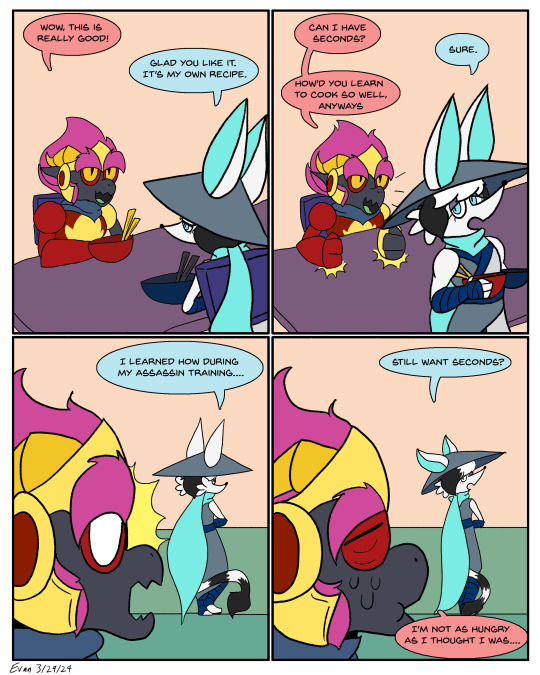
I finally managed to make a mini comic with some of my OCs I've been meaning to make for a while now.
Let me know what you think and if you'd like to see more of them in the future.
(Also any constructive feedback on how to improve, Especially on the art side, would be wonderful as well.)
#art#artists on tumblr#digital art#illustration#my art#art tag#artwork#character art#my oc stuff#oc#oc art#ocs#my ocs#original character#drawing#project: The Dragoons#character design#character: fubuki#character: Flare#webcomic#original comic#indie comics#oc comic#my comic#original characters#orginal character#dragon art#dragon oc#furry oc#furry character
16 notes
·
View notes
Text
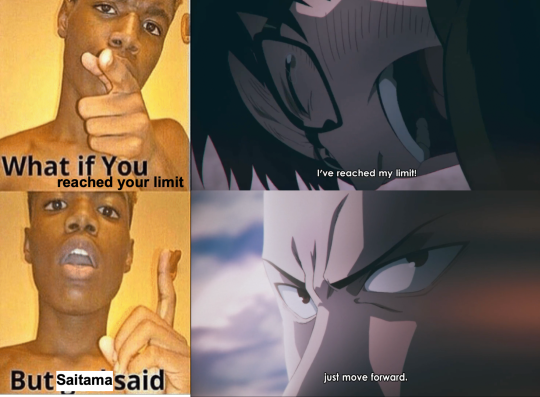
#opm#one punch man#glasses#saitama#personally i would just drop the fubuki group and keep moving forward idk tho that might just be me and glasses#does glasses even have a real name#because in my head he's not even glasses he's just green tracksuit guy#better name for him tbh#glasses is too mundane when he wears a costume like that#maybe he does have a name but i haven't started the webcomic yet#i've only watched the anime and half the manga guys#i'm getting there slowly but surely
86 notes
·
View notes
Text
Some more thoughts on 'Morality Pets Redux'
Link to original post.
ONE still blows me away by how clearly he differentiates between manga and webcomic. There's a tradeoff that he respects: if the webcomic is short, sharp and to the point, then the characters have limitations in how they can interact, try things out, and grow. Conversely, if the manga is long to the point that it can take a long time for it to get to some sort of point, the characters have more scope to find themselves. He treats both versions with respect and if there's no scope for characters to change themselves, then they don't. Which is why we have two great stories to read! :D
There's no point in Tatsumaki changing in the webcomic because there's no one willing to have her in their lives. She's been so toxic that all Fubuki wants is to be left the hell alone, and even Saitama's gone 'eh, I've lost all interest' after she rebuffs his attempts to reach out very rudely. She notes that she ends up driving everyone away, but she's far from actually accepting that she needs to change. Tatsumaki in the manga has positive reasons to change -- she has a sister who wants to get along better with her. Doing so means accepting both her and the people around her, even if it's difficult and there are legitimate challenges. It's a hard pill to swallow but she's trying.

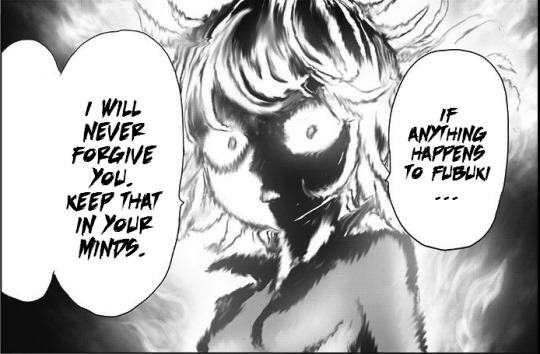
I really appreciate the difference between regretting the consequences of one's actions and being prepared to change one's actions. So human. If feeling bad about our actions was enough to change them, there'd be no anti-addiction or dieting services, counselling would be rare, and prisons would be all but empty.
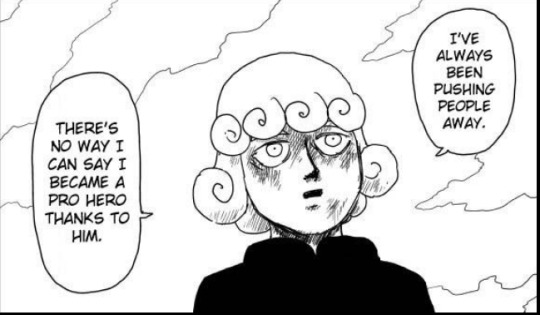
In both versions, Genos is the guy who wants ultimate destructive power and is willing to even kill himself if it'll take enemies to Hell with him. However, for a guy who is so committed to destruction, it's striking that he's cut to the quick when Sonic taunts him saying that he can't protect anyone.
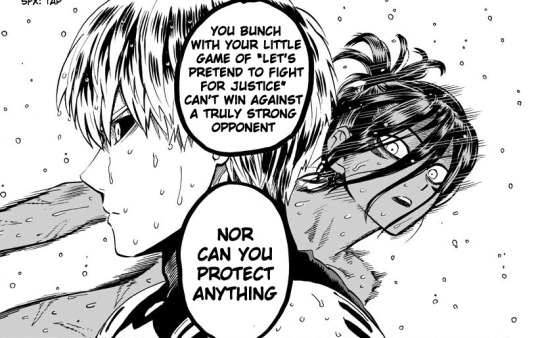
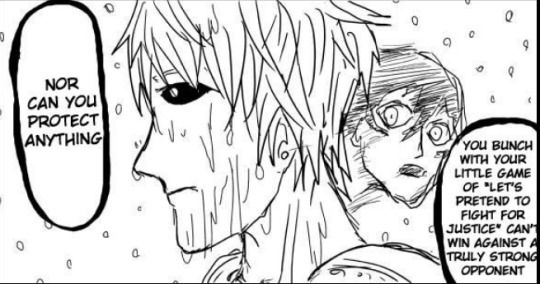
There's no scope to explore this seeming contradiction in the webcomic. We need to accept that hey, he has places where he won't go and that's fine. The manga has more space, so ONE can dig into the protect vs. destroy issue and have him have to make decisions about what he actually values. The despair that lanced through him when victory slipped through his grasp when fighting Elder Centipede says so much about what matters:
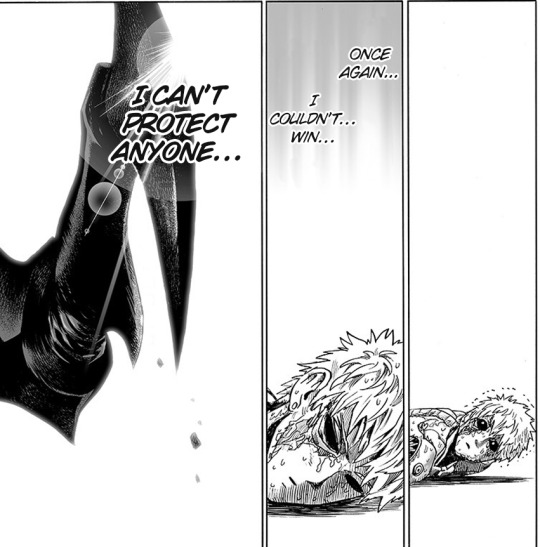
Something @carma-tjol said in their tags really added a lot to my understanding: they pointed to the link between Genos seeing himself as having value and changing his outlook on heroes from assets to people. It added so much salience to Fubuki refusing to run away and risking her life to save him because she didn't abandon her people. She really challenged his outlook.

I like that he's still wrestling with himself after the fact. Had King not come when he did, it'd have been a lose-lose situation: Tatsumaki would be dead anyway and the monsters would be free to rampage over the land and kill millions. He needed to hear Saitama telling him he'd done right to feel a sense of peace. It's very human -- it's hard not to look back even when we see that we've made the right choice.
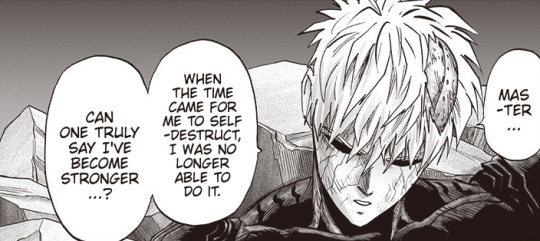
Come to that, there was something that we'd (okay me and the small sharing circle of mutuals who talk too much about Genos) had been fearing: that Saitama would just note that Genos was broken again, the way he had in the webcomic. Remember this thread? It very nearly came to pass but for King intervening and vouching for Genos so that Saitama had to change the way he saw his disciple. Thank goodness.
If King hadn't been there, because Genos is actively questioning himself, the outcome of Saitama seeming to be dismissive wouldn't have been mere depression. It'd have been total despair. What Genos would have heard is that he's weak and lacked the guts to follow through on his committment to destroy enemies even if it meant killing himself. Talk about a tragic misunderstanding! Blessedly, ONE meters his angst -- it doesn't do to crush all your character's hope in one go.
68 notes
·
View notes
Text
Doods from School
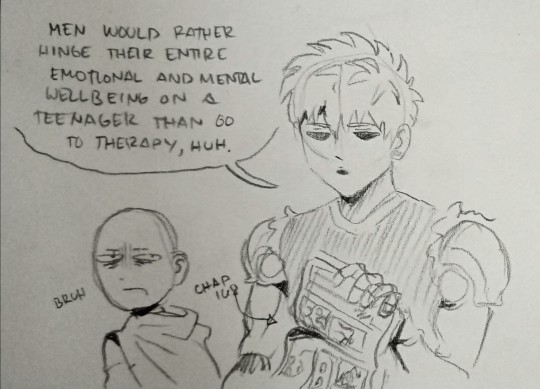

#Opm#One punch man#Opm spoilers#Opm webcomic#One punch man webcomic#Opm webcomic spoilers#Genos#Saitama#Fubuki#Garou#Can we all give these guys an F#Istwg I cant read the webcomic for too long bc I end up getting sickened by how lonely every one is#By manga comparison lol#WC Garou: your master search for you?? I had to be on my own for days on the run w no one on my side!#WC Fubuki: 'On the run'? I couldn't even garner genuine and proper love and respect from my sister!#WC Genos: you guys get cared for?#I jest in exagerration but seriously. These guys drew short horrible straws#If wc Genos heard how much better manga Genos had it I feel like he'd be absolutely crushed#I mean. I AM#one art man
385 notes
·
View notes
Text

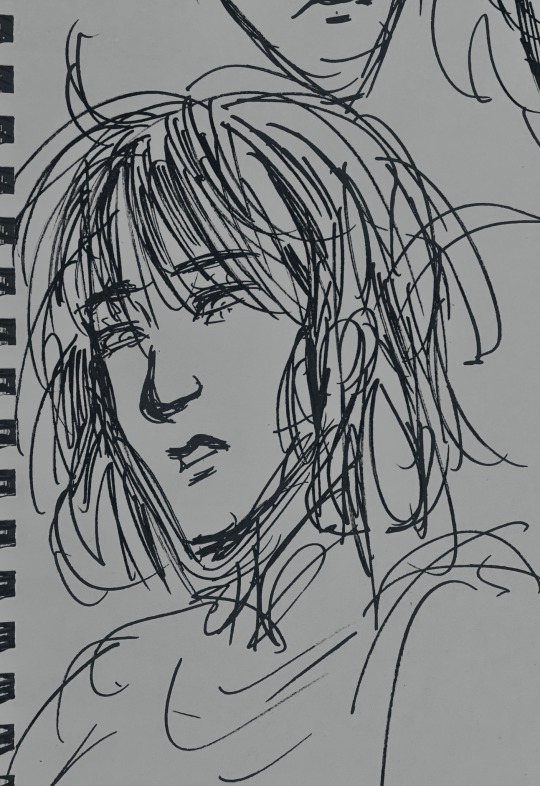

she is THE category five woman moment
#draws#post#doodles#opm#one punch man#fubuki#blizzard of hell#I LOVE HER SO MUCH SHES SO SILLY!!!!!💖💖💖💖💖#these are a mix of her webcomic and manga designs!!#i esp love her original collar and sleeves AHH
125 notes
·
View notes
Text
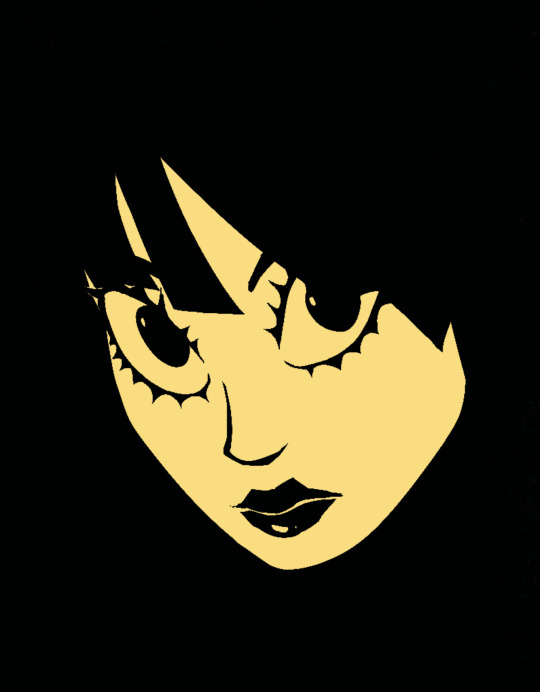
Negative space
#my art#digital#fan art#one punch man#fubuki#fubuki opm#blizzard of hell#I like when she’s drawn like this in the webcomic/manga
16 notes
·
View notes
Text
So, who wants to see more fun OPM God stuff that makes ya shit bricks?
(opm wc spoilers below cut)
Remember this panel and all those speech bubbles for Godrou being distinctly different looking? When he sounded off-character and when he got normal speech bubbles, he sounded more like old Garou like "Later, LOL" and such?
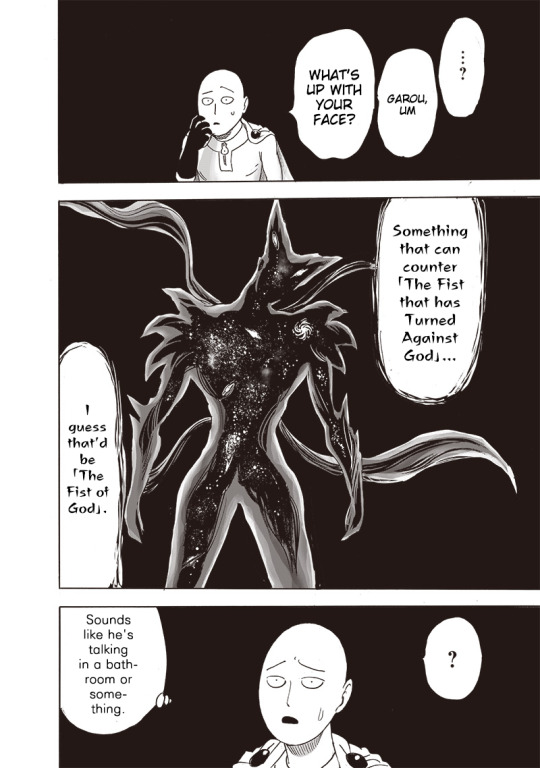
Well, I've revisited some earlier chapters and not only I've noted there being a reference to Saitama being watched by OPM God early on with the lamp reference, that much ya know about...
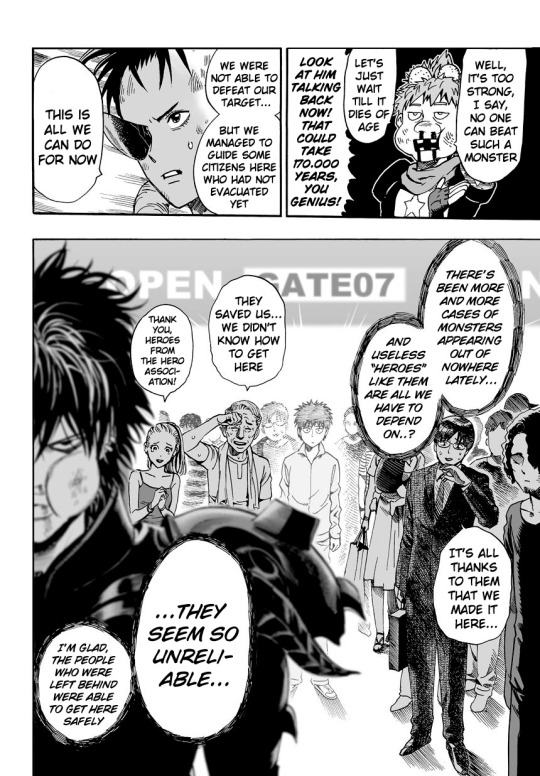
...but also being sent subliminal messages from OPM God early on.
Oh lookie, sowing distrust in other heroes early on.
Despite civilians around him praising them. Making him think he has to do everything by himself and push himself to the absolute brink of death and surpass it and surpass the limitations of human.
Gate 7, Luck, is open. But idk if it's so lucky after all, to be secret spy of OPM God. Or worse, sleeper agent. Just biding the right time.
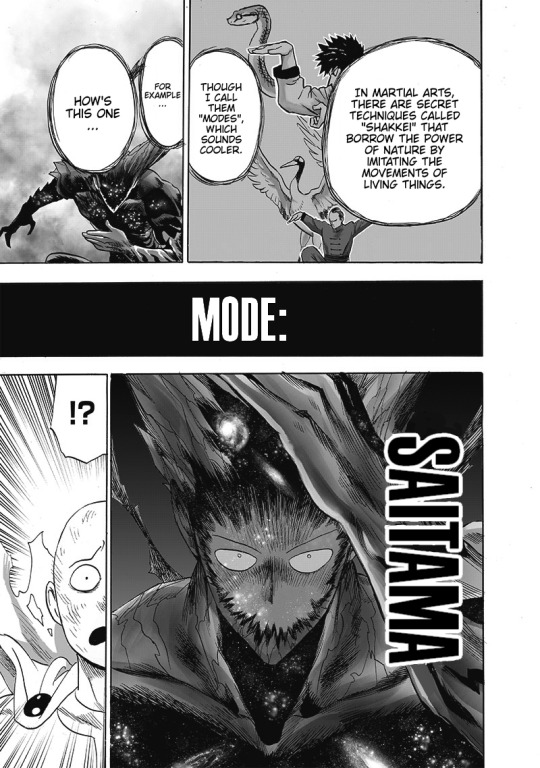
Heath Ledger's "Joker" is what comes to mind when I look at Garou and his serrated "mouth" smiley face. No wonder Sai thought it was so creepy. Below as well, Tsukuyomi with the nice ref to Batman.
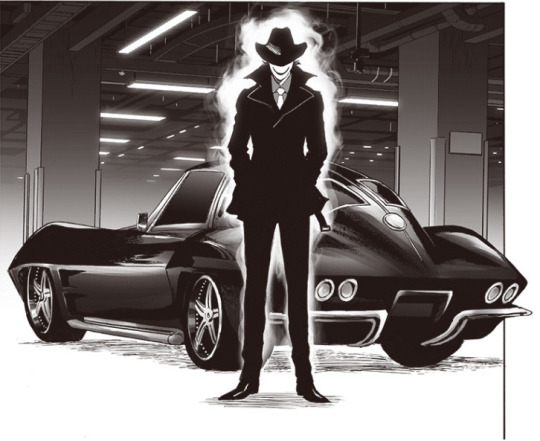
So, who wants to see 007 Saitama? The Fist that turned against Mankind? Or... Agent Smith?
Maybe black suit Saitama is a bit closer than we think it is. Just not the kind we expected though, like having fun dancing in a ballroom...not the tie version lol.
Subtle brainwashing starting from such early age would be very hard-pressed to shake away.

It would also be utterly ironic in a cruel, twisted way if Saitama uttered Garou's line from the webcomic. Because if anyone has been cruel to Saitama personally from the beginning...it has always been humans, not monsters.
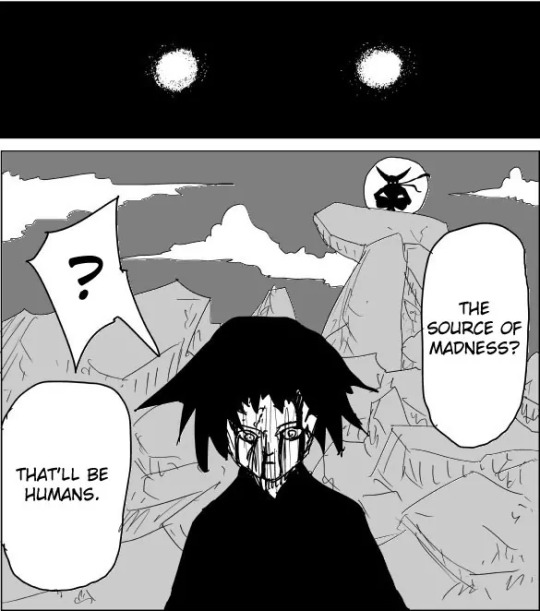
Monsters are cruel because it's in their very nature to become bloodlusted once they turn monsters...but us humans are not genetically modified to be cruel to others just because. Especially to 12-year old kids like Saitama.
Just more parallels with Garou.
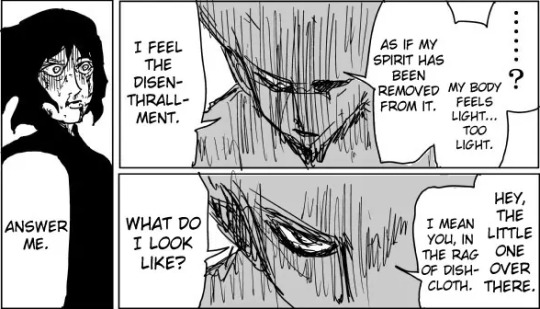
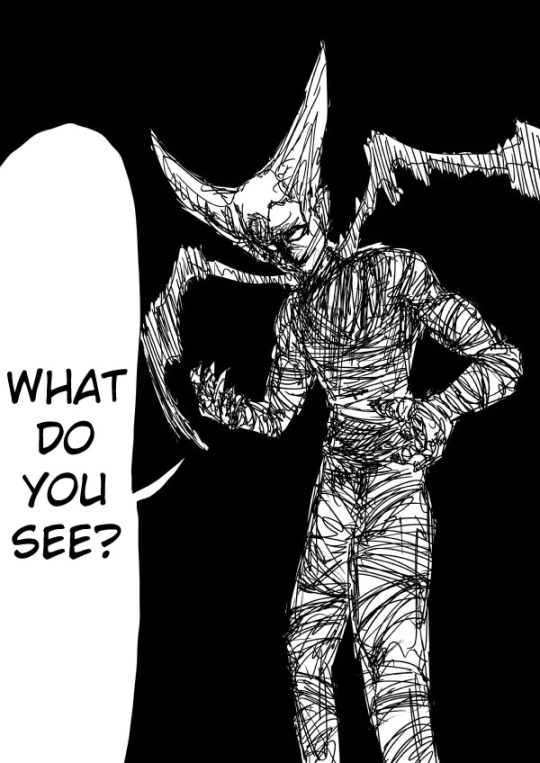
Tatsumaki treating houses like rags is oddly specific choice of words indeed, reference to how she wrung out Orochi like a dishrag and the above. And indeed, Saitama probably has the third eye just like Psykos and so, vulnerable.
Tbh I just want to see Saitama go all Shimazaki mode.
And it doesn't seem like they're the only ones being conned either.
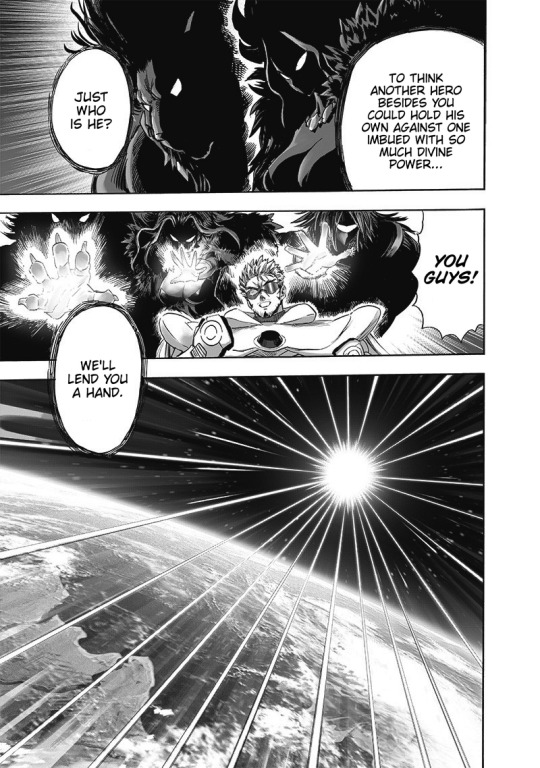
Fubuki is breaking 4th wall and spouting lines from Blasticide team Esper chick and it seems like she's being affected as well, being an esper herself, but it would seem like getting Saitama and Garou to the moon was part of the plan or part of some massive illusion that many people, especially Saitama, fell prey to.
So yeah, this is quite possibly very insidious plot going on here.
#opm#one punch man#opm god#saitama#opm prediction#garou#fubuki#subliminal messages#opm webcomic#opm webcomic spoilers#opm meta#blast
25 notes
·
View notes
Note
When I was first introduced to Fubuki (I read the manga first) I was so excited because not only was I grabbed by her aesthetic apperance but also I was expecting a hidden depth to just her annoying facade. What with her relation to Tatsumaki, the strongest esper in the story, there has got to be a story behind her too, right? But no, they did her dirty. It makes me sad and mad both at the same time. It hurts to see her existence a mere comic relief without a semblance of redeeming traits in the manga. Where did her inferiority complex go towards her sister, the one I related myself to the most? Reducing her to this annoying character that nobody could relate to. It's so insulting, for me, a person who had inferiority complex towards an older sibling. Someone, save her from this infuriating situation, unsalvageable it may be.
I don't want to get mad at her sister but the way they went with her characterization painting her as the good-natured sister with almost no flaws doesn't set well with me. Maybe it's just me and my past insecurities but, oh well, I've digressed lol
Nonetheless, thank you for your posts about Fubuki. I haven't touched both materials because I was salty and still am lmao
First of all, thank you for sending me this message!
Much like you, my first exposure to Fubuki was in the manga and her introduction arc (and in particular, its conclusion) left me very intrigued about the character and really curious about her future (and past); the bonus chapter "Numbers" then further confirmed this positive first impression. Later, I read the webcomic and Fubuki became my favorite character in the series. With precedents like these, I couldn't wait to experience certain moments of the source material in Murata's art style (or brand new original scenes/developments, why not?); but questionable choice after questionable choice, bizarre addition after bizarre addition, I slowly started to realize that something was off and that Fubuki was becoming a character I didn't not recognize: a comic relief character with little to no presence in the story, a far cry from her webcomic counterpart and what made me like the character in the first place - this made me also re-evaluate the way Fubuki was handled from the outset of the manga, in particular with baffling additions like "A New Wind Blows" and the fight against Do-s.
So I totally share your disappointment. There is something uniquely infuriating about this character being constantly humiliated and ridiculed, used almost exclusively to prop sympathy towards her sister or provide unfunny gags at the expense of her character. And I completely agree: the fact that Fubuki in the webomic (and, to be fair, even in the early parts of the manga) is a character whose story and struggles feel real and human, insomuch that many readers can relate to and empathize with her even for personal reasons, makes this all the more insulting.
And I feel like you about Tatsumaki, honestly. I didn't mind her in the webcomic, but the special treatment reserved to Tatsumaki in the manga made me dislike this version of the character, which apparently requires Fubuki to always be sidelined and undermined for her sake. The favoritism towards her couldn't be more blatant than it is, as everything bends backward towards Tatsumaki and the narrative always takes her side. With the original narrative framework behind the sisters's relationship being thrown out of the window - after all, the antagonist of Fubuki's character arc became a paragon of all virtues and nearly all Tatsumaki's flaws and less-than-flattering moments disappeared - Fubuki's backstory was never properly addressed and her traumas were never explored but completely glossed over, with the sister "conflict" being also resolved literally overnight, in a brief conversation that took place in the middle of the MA arc of all times (and apparently that was all it took to mend their soured and falling-apart sibling relationship). All of this resulted in a character that is impossible to relate to, as you perfectly said: after all, any single element that originally made Fubuki's sympathetic and endearing was straight-out removed, including something as important as Fubuki courageously confronting and fighting her sister (or Fubuki's flashback set in her childhood years, and the list goes on and on).
Therefore, considering how mean-spirited the treatment reserved for Fubuki has been in the manga, I completely understand you for not keeping up with the series anymore. I haven't read any new chapter of the manga since the end of the Esper Sisters arc, which was almost painful to read, and, right now, I have no interest in doing so - I gave them a glance just out of curiosity, but that's pretty much it. As for the webcomic, I still have hope and so I'm still reading it every time it updates. My only issue with Fubuki in the source material is her "recent" lack of screentime, which in itself wouldn't be a problem at all since the current arc doesn't directly involve her (not yet, at least), but with the terrible precedent set by the manga I can't hide that I'm a bit worried about her future.
In any case, seriously, thank you again! I very much enjoyed reading your message and I'm glad you appreciated my posts! Also, sorry for the late reply!
3 notes
·
View notes
Text
youtube
I finally got around to finishing my Dystopian Review of One Punch man. It's a bit long, but give it a watch and let me know what you think!
#One Punch Man#OPM#Yusuke Murata#ONE#Saitama#Fubuki#Tatsumaki#Genos#Boros#Jesse Pohlman#Dystopian Review#Dystopian Literature#Manga#Anime#Garou#Superhero#Webcomic#Review#Literary Analysis#One Punch Man Review#One Punch Man Video#Youtube
2 notes
·
View notes
Text
Rating OPM Characters Solely On How Good Their Fan Art Usually Is
Saitama- 7/10, lots of fun headcanons, but also a lot of really terrible outfits and out of character interactions. Sometimes they make him smile like a normal person and it scares me.
Genos- 2/10 Ya'll be waaay too thirsty, I am so tired of seeing this man half dressed on my timeline, at least tell me something you think is cool about him (you aren't allowed to mention his looks.)
Garou- 6/10 also a lot of horny posting with him, but usually it's cool anatomy studies so that makes it a little more bearable, plus I think he's cooler than Genos so I'm innately biased.
Fubuki, Psykos, Tatsumaki- 0/10 Go to horny jail.
Mumen Rider- 8/10, not enough of him, but what I do see is usually pretty dope. Artists seem to be more creative with characters they aren't horny for.
Manako- 10/10 I have never seen a bad post about pink flesh grape, she's got some funny ass fans.
Flash and Sonic- 0/10 Go to horny jail.
#opm#one punch man#fubuki#tatsumaki#terrible tornado#blizzard of hell#saitama#genos#garou#psykos#mumen rider#manako opm#anime#manga#webcomic#rants#rants about opm
35 notes
·
View notes
Text
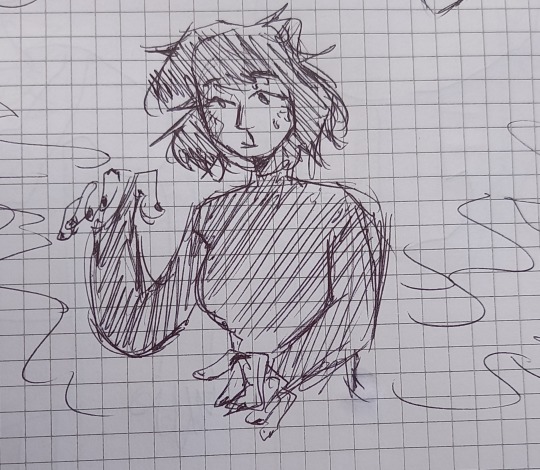
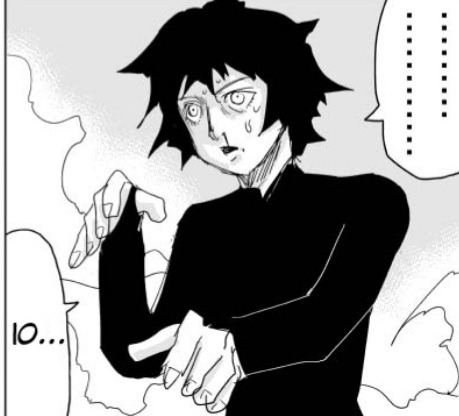
webcomic fubuki redraw bc why not ( really proud of this)
83 notes
·
View notes
Text

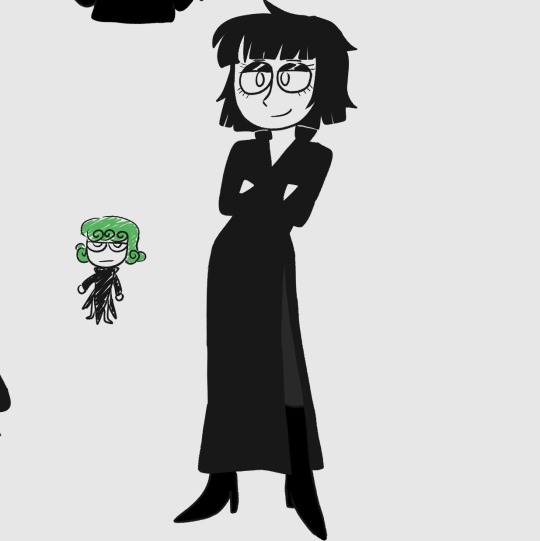

psychic sisters
20 notes
·
View notes
Text
OPM Manga Update 221 Review: Epicenter
Story
So, let's keep this summary short. We get Psykos's backstory as a series of flashbacks in which she goes round recruiting others to their cause, expounding on her successes to an unenthusiastic Fubuki. She researches the 'third eye' ability to enable her to see into the future and succeeds. What she sees leaves her so disturbed that she decides that the best thing to do with the verminous mass that is humanity is to eliminate it altogether. The sight of her initial freak out segues into her freaking out as she faces Fubuki in the battlefield, only to collapse... she really was running on fumes. Fubuki catches her and muses what it was that Psykos had seen back there, and an image and words come to her head, unbidden. The vision vanishes nearly as quickly as it comes leaving a shaken Fubuki wondering what she saw. It's God (no ID) but she has no way of knowing that.
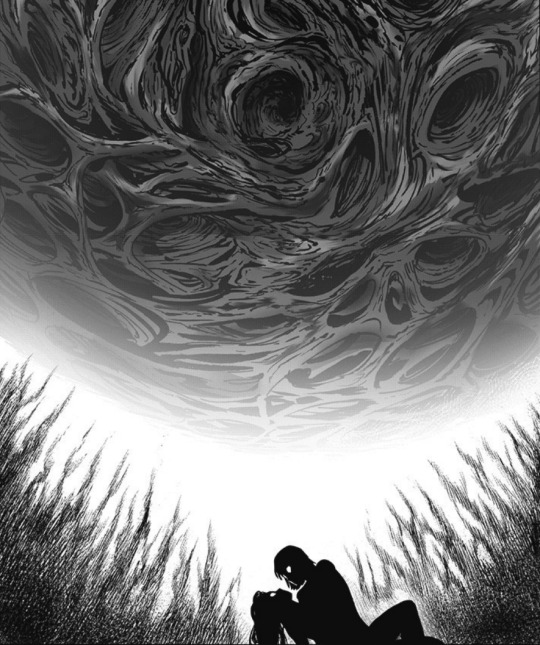
One thing is clear to Fubuki: she has to get Pyskos to talk, cost what it may. She barges into the visitation and orders it stopped, saying that with the prisoner list now published, Tatsumaki was sure to come along to kill Psykos and it's in everyone's best interest to leave as quickly as they can.
Right on cue, Tatsumaki breaks into the holding cell and makes a credible show of trying to kill Psykos, and launches the Tsukoyomi rep into the nearest wall. The Tsukoyomi representative isn't phased and gets up. He launches a counter attack and in the melee, Saitama, who has just been standing there, falls into a crevasse that opens up under his feet. Ironic, given that Fubuki had just been praising him for being an ascended one similar to Garou, whose strength she was glad to have.
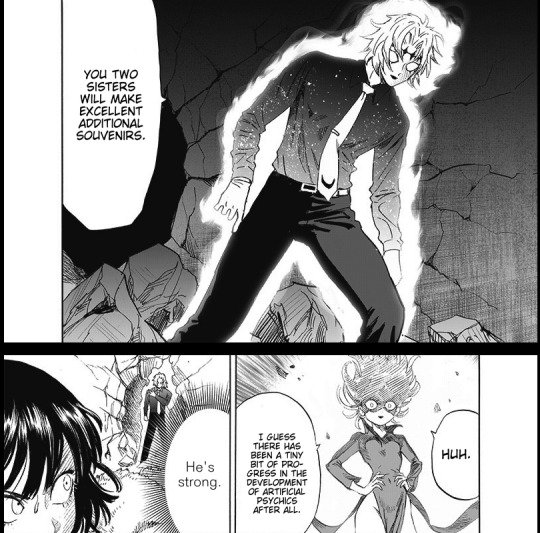
We end the chapter with Saitama surrounded by demon-level monsters, who, glad of having had their containment fail, are also glad of this free snack before they break out properly and kill all the humans there. Saitama's more glad than worried as it means he can justify keeping pets after all.
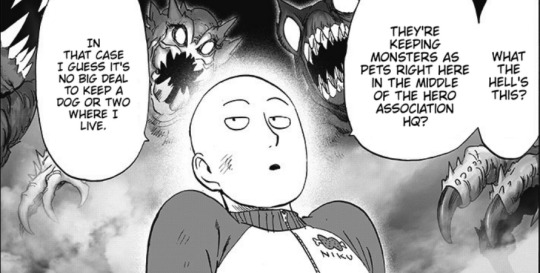
Meta
Again that issue of balance
Right from the first chapter when Vaccineman declared humanity a pestilence that was killing the Earth, to Dr Genus talking about God giving every creature a limit so as to maintain its purpose, to even Blast's advice to Tatsumaki, which both nearly got her killed and saved her life in the same night, balance, that idea of all things having their proper place, is something that comes up repeatedly in the story.
Once again, the issue of balance is back. A young Psykos looked at the future and realised that humanity was utterly out of control. By our very natures, we seem bound to commit overreach without considering the future. Normal people encountering this reality go organise. Less-normal ones already committed to subjugating humanity take it one step further.
Given that the vision she saw was divinely inspired, if God (no ID) has been talking to Psykos, why shouldn't we consider Psykos a victim who ought to go scot-free? Very simply: realising that humanity is over-using the Earth's resources and driving ruin is one thing. Deciding that the solution is to kill everyone? That's all her. God (no ID) loves to approach people who want simple, sweeping answers to complex problems. Maybe give them a tool or two. Then sit back and watch the carnage. ONE doesn't let characters who commit atrocities with God's tools go: the best he could do for Garou was a redemption equals death ending. He's not about to let Psykos go either.

Sister Act
I thought I'd be starting with Tatsumaki asking Fubuki for help, but, momentous though that is, it's the second-most important thing I want to talk about. The first is that, whatever Tatsumaki's full reasons for wanting to save Psykos from the clutches of Tsukoyomi, those reasons are important enough for her to deliberately trash her reputation and make the Hero Association believe her to be crazy. There are sure to be severe reprecussions and she's willing to risk them. The story has been at great pains to show us how much the Hero Association relies on Tatsumaki, and how she enjoys that fact, even though she complains about being over-relied on. The last arc has shown us why the HA has such trust in Tatsumaki as we got to see just how capable, considerate, and courageous she is.
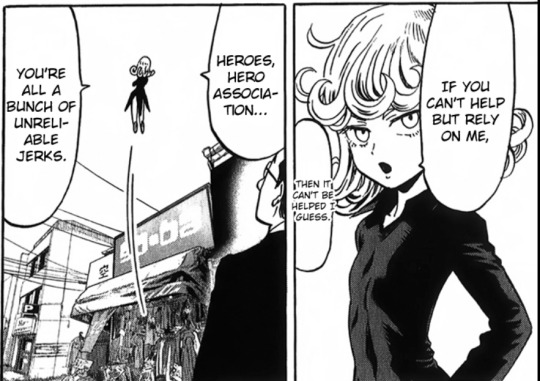
It's also shown us that Tatsumaki isn't 100% impulsive. Wringing Psykos's neck is something she'd gladly have done over and over, but she curbed it long enough to literally wring information out of Psykos to ensure that the heroes rescued every last human held at the Monster Association.

For Tatsumaki to throw the trust justifiably invested in her away is non-trivial. It means so much to her and she's trashing it for the sake of a villian she really would rather see dead. Is Tsukoyomi really that great a threat? Some other reason? It will be very interesting to find her reasons.
At the same time, she has arranged things so that Fubuki comes out of the situation well, being the principled hero who warned of the danger and did her best to ward off her crazy sister.
Which brings us to the next most interesting thing: Tatsumaki enlisting Fubuki's help. One thing I had feared (but would have respected) was that Tatsumaki would dismiss the help she had to receive from others -- most notably from Genos -- as a one-off, never-to-be-repeated event. Something seems to have sunk in with her to consider reaching out to her sister. Fantastic.

I say again and again that a central tenet of ONE's writings is that 'when people do more, they get to be more, ' and I'm glad to see that it's once again on the cards. Since the sisters have long been able to build a relationship that is cordial and trusting enough for them to actually hang out, the issue Fubuki had with Tatsumaki was the latter not respecting her as a hero. And to be fair, Fubuki, with her habit of hiding behind others and only looking to punch down whether at monsters or people, was nothing to respect. Once Fubuki earned some measure of respect from her sister by coming out to do the difficult and dangerous of her own free will, the story has been able to move the hell on! Artificial espers and organised evil? Sure, bring it on! In turn, Fubuki doesn't know why her sister is doing what she is, but she trusts her sister sufficiently to work with her.
The manga edition of the Psychic Sisters arc may feature them cooperating for now but how long that cooperation lasts, given that they have different ideas of what to do with Psykos, we'll have to see.
Playing Dumb
It's hard to say how aware Saitama is at any given time as he's both extremely obtuse and extremely insightful, often within the same breath. Nice to see that someone else has been able to piece things together. Fubuki may or may not have seen Saitama take out Garou, but she saw enough of Garou both before and after he ascended into Cosmic Garou to know that he was Something Else. She's seen enough of Saitama to know that if it was going to be anybody, it'd be him, not the much-bandied around theory about it being Blast.
Saitama, is of course, nonplussed. Again with someone insisting that he defeated Garou. Again with someone praising him for just being who he is. And oh, will you look? The ground appears to have opened up. He's very unbothered by it all.
How is Saitama going to fit into all this? Well, first he's going to make some short work of some monsters. Other than that, all I'm sure of is that things are about to go sideways in a big way. Saitama on scene generally means bad news for any other heroes who are around.
Short notes
Feral Tatsumaki who never learned to eat with Western cutlery is too cute for words.
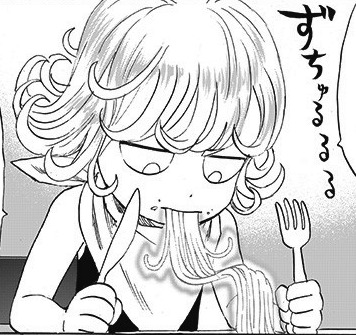
Couldn't have happened to a nicer set of assholes: the one good thing the Tsukoyomi rep has done.

Speaking of acquisitve bastards, I'm so glad Genos isn't here. With his acquisitiveness, the idea of artificial espers would get his attention for all the wrong reasons.
#OPM#review#Update 221#Tatsumaki#Fubuki#Pyskos#Saitama#Tsukoyomi#the plot thickens#no this arc isn't the Psychic Sisters arc (webcomic edition) where the sisters fight for recognition#this is the Psychic Sisters arc (manga edition) where the sisters fight an external enemy and cooperate -- at least for now#once Psykos is secure they will probably have *very* different ideas about what to do with her#also it's good to see one of the organised evils out there finally make an appearance in the story! Let's see how it goes
37 notes
·
View notes